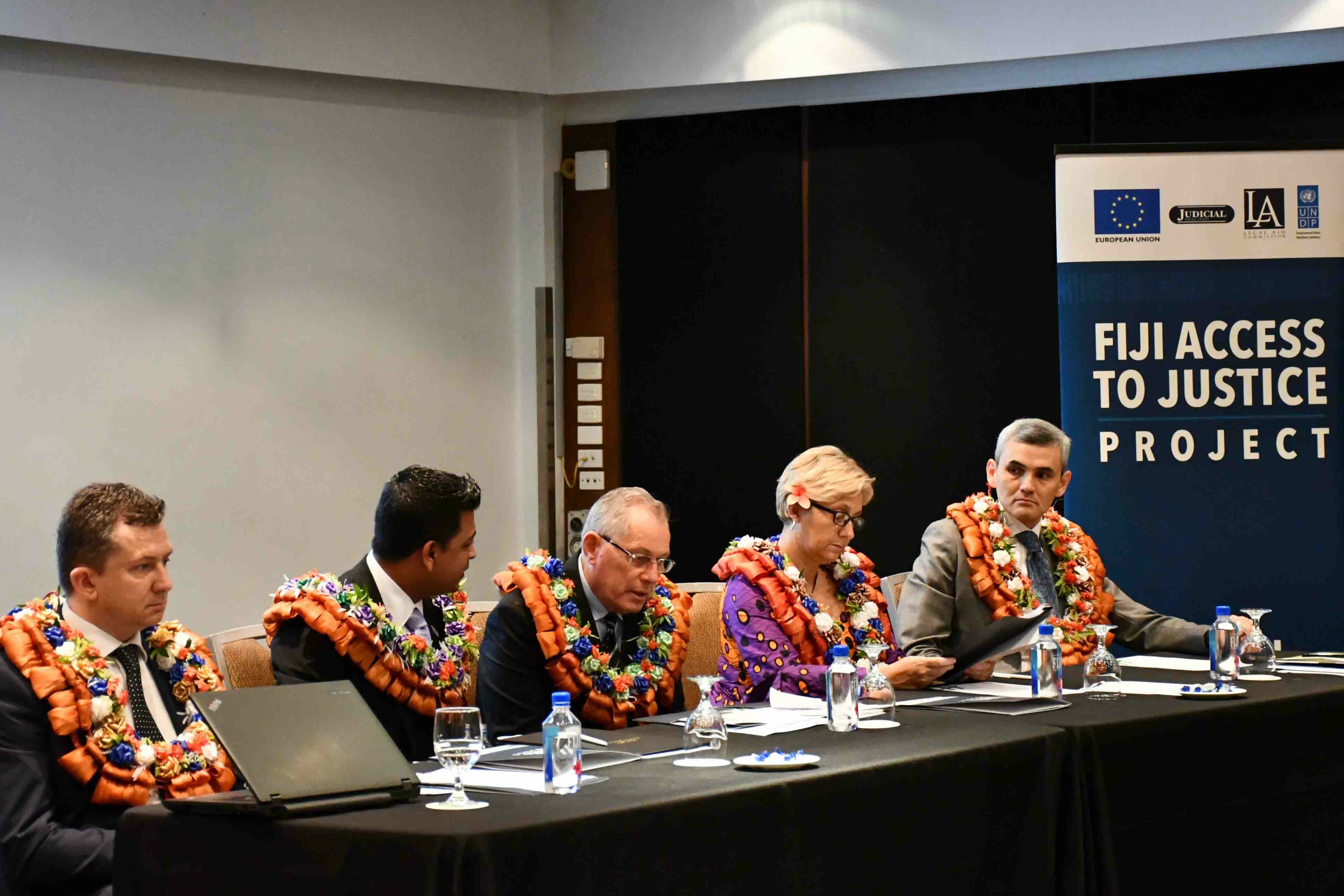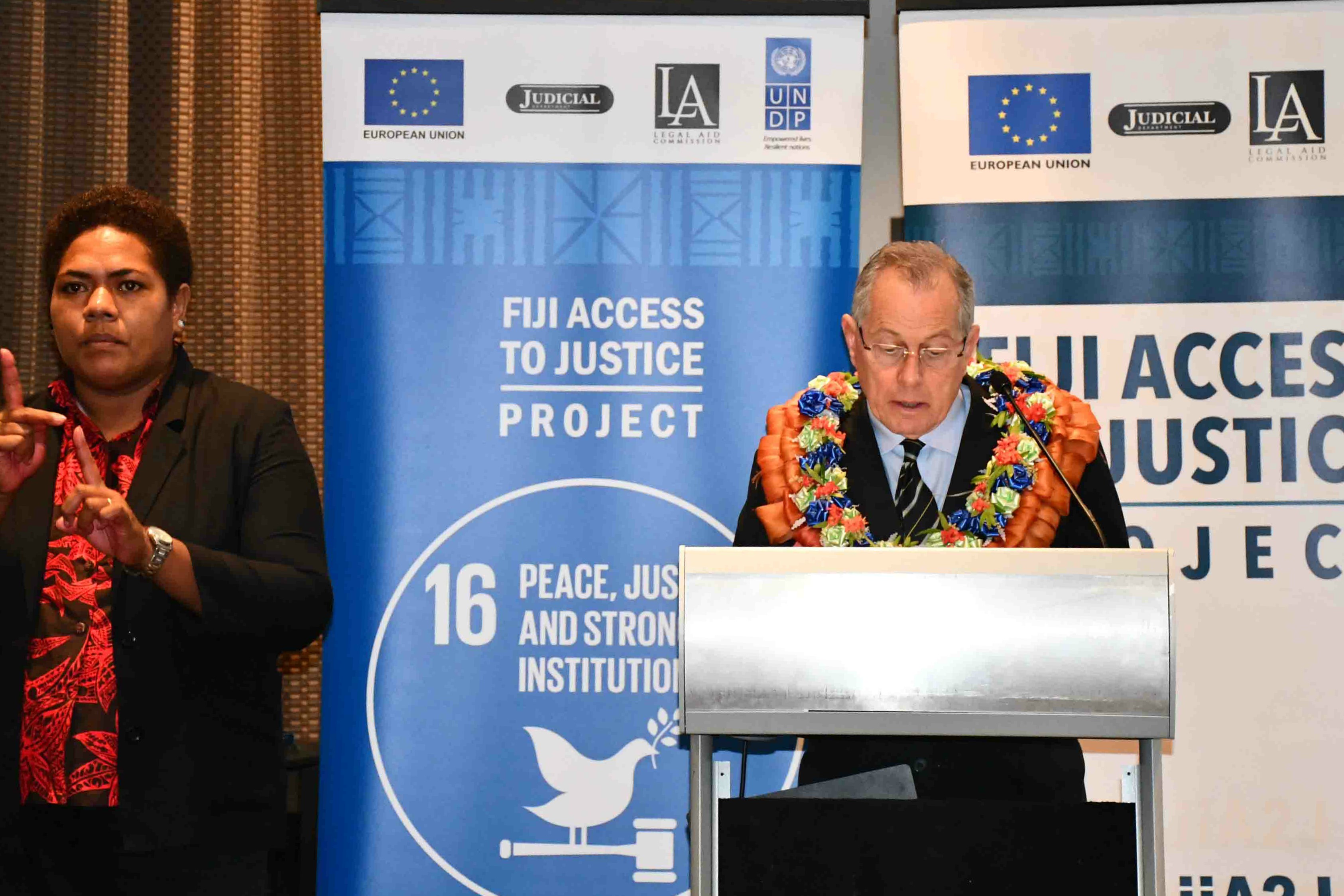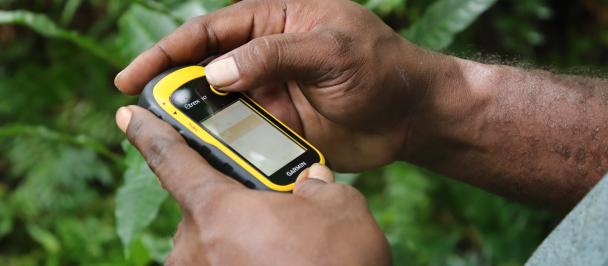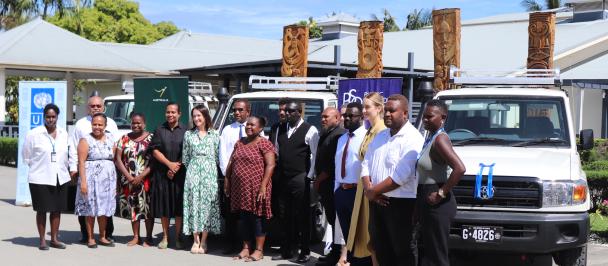(L-R) Martin Gramatikov, Team Leader, the Hague Institute for Innovation of Law; Shahin Rafique Ali, Acting Director, Legal Aid Commission; Hon. Chief Justice Anthony Gates, Judicial Department of Fiji; Ingrid Swinnen, European Delegation Team Leader, Governance and Natural Resources; and Bakhodir Burkhanov, Country Director, UNDP Pacific Office in Fiji and Head of Regional Programme and Policy, at the Access to Justice Assessment launch. (Photo: UNDP/Ria Sen)
Suva, Fiji - On 1 March 2018, the Judicial Department and the Legal Aid Commission officially launched the Access to Justice Assessment with funding from the European Union (EU). Strengthening access to justice, rule of law and promoting human rights are cornerstones of the United Nations Development Programme’s (UNDP) work to achieve sustainable human development. In order to produce comprehensive data and a systemic analysis of Access to Justice in Fiji, the EU-funded Fiji Access to Justice Project is conducting the first of its kind Access to Justice Assessment of Fiji, with the support of the internationally renowned firm The Hague Institute for Innovation of Law (HiiL).
The rationale for the Access to Justice Assessment is data collection and analysis across the justice sector, which will serve as the foundation for an evidence-based approach to justice reform and contribute to overall good governance. By providing a solid base of evidence, the A2J assessment will promote a culture of accountability and transparency through application of rigorous methodology and research standards, helping to illuminate the interdependent needs, processes and elements of the justice system to improve functioning as a whole. In addition, it will give voice to the experience and needs of the most vulnerable groups in society, including women and persons with disabilities.
Mr. Bakhodir Burkhanov, Country Director and Head of Regional Policy and Programmes for the UNDP Pacific Office in Fiji opening this event said, “The assessment we are embarking upon will seek to analyze whether citizens are actually able to access and use justice institutions to solve their common justice problems, identify factors affecting their ability to do so, and examine what reforms and programmes could make justice sector institutions more responsive to citizens’ needs. Beyond this, the assessment will also sample the citizens’ perceptions on access to justice. This represents a brave and necessary move.”
(R-L) Hon. Chief Justice Anthony Gates, Judicial Department of Fiji officially launches the Access to Justice Assessment, and a sign language interpreter. (Photo: UNDP/Ria Sen)
Hon. Chief Justice, Mr. Justice Anthony Gates formally launched the Assessment stating, “This is another step along the path of access to justice for the people of Fiji. The assessment […] will provide data, information and feedback. It is right to have the humility to seek such assessments.”
“The launch of the Access to Justice Assessment today begins a systematic analysis of the existing state of affairs. From the collection of results, we expect to be able to plan how we can improve services as the public perceives its greatest need.”
The EU Delegation Team Leader for Governance and Natural Resources, Ms. Ingrid Swinnen remarked, “The Access to Justice Assessment that we are launching today will be conducted using a thorough methodology and a combination of tools that have been tested in many countries. As the EU, we are particularly happy to see that a gender analysis will also be incorporated into this process. Gender data are critical to ensure more gender sensitive services. We also believe that this initiative will not only empower citizens as rightsholders in accessing and using state and non-state institutions, but it will also facilitate strengthening the capacity of these institutions to deliver justice.”
The Acting Director of the Legal Aid Commission, Mr. Shahin Rafique Ali stated, “The purpose of this Access to Justice Assessment is to know where we are headed, but in order to know this, we need to know where we have been and where we are now. We need to know what the priority issues are to determine how best to allocate our resources to ensure access to justice for Fijians is guaranteed and provided to the fullest extent possible in a manner which is professional, efficient and without compromising on quality. With this in mind, we are proud and eager to see the Access to Justice Assessment being carried out.”
In regard to the content and approaches of the Access to Justice Assessment, Mr. Martin Gramatikov, Team Leader, HiiL said, “UNDP and HiiL will talk to the people of Fiji about their experiences with the law, using a ‘bottom-up justice’ approach. The approach is about asking the people about situations such as disputes and disagreements faced in everyday life, where they go for legal advice, and which dispute resolution mechanisms are used. This will enable mapping out the demand for justice in Fiji.”
“HiiL and UNDP will also talk to the major justice institutions in Fiji, including judges, private and legal aid lawyers, prosecutors, police officers and advocates from the civil society. This will provide a bird’s eye view of access to justice and will allow for better prioritizing, planning and delivery of justice services – the justice ‘supply’. The goal is to contribute to improvement of the rule of law in Fiji because access to justice underpins the guarantee of all fundamental human rights.”
The Access to Justice Assessment, which HiiL is working with UNDP to undertake, will be conducted using a mixed methodology approach, including broad based randomized public household surveys, expert surveys, focus groups discussions, expert group discussions and documentary review as research tools to gather both quantitative and qualitative data. Public surveys and focus groups are particularly effective methods of collecting data to illuminate the needs and opinions of diverse and underserved groups, which include the impoverished and most vulnerable. A participatory gender analysis is incorporated into this process.
The Access to Justice Assessment will additionally be utilized to establish baselines and also importantly inform the detail of future project activities. It will also identify priority access to justice issues, and provide recommendations for government, civil society, international stakeholders, and the Fijian citizenry, to address those issues in line with both citizen and institutional needs.
The Fiji Access to Justice Project, funded by the EU and implemented by UNDP, runs from 2016 to 2020. This Project supports access to justice for impoverished and vulnerable groups through empowering people to access legal rights and services through the relevant key justice institutions, in conjunction with strengthening those key justice institutions to undertake improved service delivery.
The Fiji Government has endorsed the Sustainable Development Goals which highlights the importance of access to justice as an enabler for development and an outcome of development in its own right. At Goal 16, there is commitment to promote peaceful and inclusive societies for sustainable development, provide access to justice for all and build effective, accountable and inclusive institutions at all levels. At Goal 5, there is commitment to achieve gender equality and empowerment of all women and girls. The Fiji Access to Justice Project supports the achievement of these goals.
Contact information:
Ria Sen, Reporting and Communications Specialist, UNDP Pacific Office, Suva, Fiji. Tel: +679 322 7577, Email: ria.sen@undp.org
Mohammed Nazeem Kasim, EU Press Officer, Suva, Fiji. Tel: +679 3313 633 Email: Mohammed-Nazeem.KASIM@eeas.europa.eu or delegation-fiji@eeas.europa.eu

 Locations
Locations





